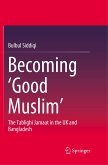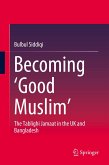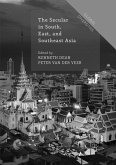
Broschiertes Buch
The Tablighi Jamaat in the UK and Bangladesh
Softcover reprint of the original 1st ed. 2018
30. Januar 2019
Springer / Springer Nature Singapore / Springer, Berlin
978-981-13-5608-7

Gebundenes Buch
The Tablighi Jamaat in the UK and Bangladesh
1st ed. 2018
7. Dezember 2017
Springer / Springer Nature Singapore / Springer, Berlin
978-981-10-7235-2
| eBook, PDF | 73,95 € |
Ähnliche Artikel

Broschiertes Buch
Interbeing Rituality in a Living World
1st edition 2022
1. Februar 2024
Palgrave Macmillan / Springer International Publishing / Springer, Berlin
978-3-031-10296-7

Gebundenes Buch
Interbeing Rituality in a Living World
1st edition 2022
1. Februar 2023
Palgrave Macmillan / Springer International Publishing / Springer, Berlin
978-3-031-10293-6

Broschiertes Buch
Softcover reprint of the original 1st ed. 2017
13. Mai 2018
Palgrave Macmillan / Springer International Publishing / Springer, Berlin
978-3-319-85351-2

Gebundenes Buch
An ethnological study through data analytics
2024
15. Juni 2024
Springer / Springer Nature Switzerland / Springer, Berlin
978-3-031-54430-9

Gebundenes Buch
Human Evolution and the Ancestors
1. Auflage
19. Juli 2021
Polity / Wiley & Sons
1A509547460

Gebundenes Buch
1. Auflage
11. Mai 2018
Wiley & Sons / Wiley-Blackwell
1A119222290

21,99 €
Versandfertig in 6-10 Tagen
Broschiertes Buch
Spiritual Warfare in Africa and Melanesia
Softcover reprint of the original 1st ed. 2017
23. August 2018
Palgrave Macmillan / Springer International Publishing / Springer, Berlin / Universitetet i Bergen
978-3-319-85819-7

Broschiertes Buch
Softcover reprint of the original 1st edition 2019
1. Februar 2019
Palgrave Macmillan / Springer International Publishing / Springer, Berlin
978-3-030-07751-8

Broschiertes Buch
1st ed. 2011
10. Februar 2011
Palgrave Macmillan / Palgrave Macmillan US / Springer, Berlin
978-1-349-29233-2
Ähnlichkeitssuche: Fact®Finder von OMIKRON
